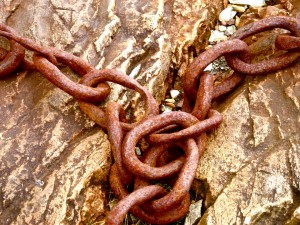Palestine
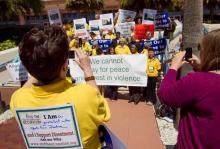
United Methodists twice rejected measures on Wednesday (May 2) that called for the denomination to divest from companies accused of contributing to the Israeli occupation of Palestinian territories.
Neither vote was particularly close, with about two-thirds of the 1,000 delegates gathered in Tampa, Fla., through May 4 rejecting the calls for divestment.
The UMC rejected similar measures at its last General Conference in 2008.
I was asked recently, is there really any hope for Israel? The answer is yes, there is.
First, the state of Israel has lived its entire existence in the foxhole of the war paradigm. It is time to come out of the foxhole. It is time for Israel to exercise profound concern, not only for its own security and its own peace, but also for the security and peace of its neighbors—the Palestinians.
Second, It is time for Palestinians to recognize Israel’s right to be secure. Israeli mothers should never have to worry if their daughters and sons will return from a walk to the market. Every Israeli should not have to live in extreme fear and the ever present threat of war.
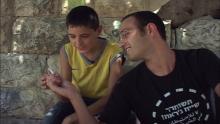
The problem with peaceful protests is that they lack all the headline-grabbing horror of wars and terrorist attacks. They lack the “power of attention” as filmmaker Julia Bacha likes to say, and that is part of what compelled her and others to produce the documentary, “My Neighborhood,” premiering this week at the Tribeca Film Festival.
Bacha and her team from Just Vision are best known for their award-winning film “Budrus,” the story of a peaceful protest by Palestinians against the Israeli “security wall” that was planned to bi-sect their village. The film, shown in theatres, churches and on campuses, has helped create a dialogue not only about peaceful Palestinian protests, but also about the Israeli activists who have allied with them.
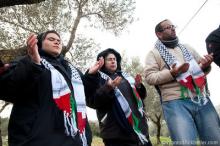
Two weeks ago, the Israeli ambassador to the United States, Michael Oren, claimed in an article in The Wall Street Journal that the exodus of Palestinian Christians from the West Bank and Gaza is the fault of Palestinian Muslims. The article was full of inaccuracies and even lies, and Palestinian Christians responded with anger and disgust. The Wall Street Journal then featured some of these responses.
This is a serious issue for Palestinian Christians. We are not saying that radical Islam is not a threat. We are not denying that there are some struggles that we face as a minority. We are not denying that there are some incidences in which Christians were attacked by radical Muslims, like in the death of Rami Ayyad in Gaza.
What we are saying, is that for us, the real issue and the core of our struggles is the Israeli occupation.
In a speech to the American Israeli Public Affairs Committee’s annual policy conference in Washington, D.C. on Sunday, President Obama urged Israeli leaders to refrain from "loose talk of war" related to escalating tensions with Iran. Quoting his predecessor President Theodore Roosevelt, Obama said when it comes to the Iran situation, both the United States and Israel would do well to, "Speak softly... and carry a big stick."
Obama meets with Israeli Prime Minister Binyamin Netanyahu today at the White House. Netanyahu, who is scheduled to speak to the AIPAC conference this evening, issued a short statement repsonding to Obama's speech Sunday, saying in part, "I appreciated the fact that he said that Israel must be able to defend itself, by itself, against any threat."

In mid-December, the Religion Newswriters Association released its top 10 religion stories of the year.
The Associated Press now has its annual poll of U.S. editors and news directors and their choices for the top news stories of 2011.
Since this exercise is certainly a subjective one, your list might also be different from mine or the AP's. What would you add or delete from these lists?
The disturbing footage of the monks fighting in Bethlehem’s Nativity Church has been seen around the world. This is not the first time such a fight has erupted. The natural reaction any Christians should have upon seeing this footage is shame. It is difficult to even describe in words what one feels when he sees Christian clerics involved in such violence and rage!
This incident reflects at least two major deficiencies within the Palestinian Christian community. The first is the status of the church and how it is still controlled by foreign powers. Palestine and the "holy sites" have always attracted Christians who want to control these places. Everyone wants a share of the place. This is the story of the church in Palestine in a nutshell. Though we have called this place home for centuries, we have never in reality governed ourselves, as a people or as a church. Wars have emerged over control of the sites, from the crusaders, through the Crimean War, to our modern era, where a fragile "status quo" from the days of the Ottoman Empire governs the relationship between the different church families and who controls what in the holy sites.
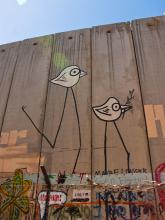
A hegemonic power that separates and excludes is not of Jesus. I came away from the deep darkness settling on the land of the Holy One to declare along with my fellow Kairos delegates that, to paraphrase Bishop Marianne, “the fate of the free world depends on a civil society committed to Christ and a persistent, all-encompassing faithful non-violent tenacity pursuing creative and compassionate resistance.“
We must respond to those faithful ones behind both sides of the walls who are saying to us, “Come and See and Be with the people.” We must feel what Jesus felt as he witnessed tyranny and empire – the principalities and powers that oppress and dispossess and kill the poor for whom He had a heart. Please listen to the cries of the oppressed and act today in doing at least one small thing to bring a just peace…make a personal and if possible corporate choice in this critical moment of God’s Kairos.
If all who hear the “Bethlehem Call” respond then momentum will build for the liberation of all God’s children in the Holy Land.
Ridiculous. Ignorant. Racist. Dangerous.
These are just a few of the terms that flew out of the Middle East this weekend following Newt Gingrich’s unwelcome remarks about Israel and the Palestinians on Friday.
As the Republican front-runner, Gingrich was speaking to the cable TV Jewish Channel and hoping to curry favor with its conservative pro-Israel constituency.
What did he do? He described the Palestinians as an “invented people” and lumped every Palestinian under the terrorist umbrella. There is no difference between Hamas and the Palestinian Authority, he said.
On Saturday night during the ABC Republican debate, Gingrich doubled-down: “They [the Palestinians] are all terrorists.”
A few of the other candidates looked, well, alarmed.
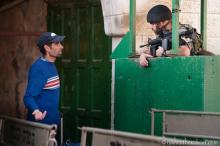
A change is taking place in how evangelicals are looking at the Middle East.
Many evangelicals, who were discouraged by the failed prophecies and the “mood of doom” that dominated the evangelical church in the second half of the 20th century, are rediscovering that the gospel also speaks powerfully to issues of peace, justice, and reconciliation.
Books about the end times, such as those written by Tim LaHaye and Hal Lindsey, no longer dominate the bookshops, and people are being challenged by writings that focuses on the here and now, instead of the there and then!
In particular, the evangelical church typically has looked at the Middle East through the eyes of prophecy, leaning towards an unconditional support for Israel. Evangelicals in the West cheered the creation of the State of Israel in 1948 and the subsequent wars, believing them to be signs of the second coming of Christ—all the while neglecting the impact these events had on real people in the Middle East, specifically on Palestinians, and especially on the Palestinian Church.
The irony for Palestinian Christians is that evangelicals, with their over-emphasis on prophecy, have lost the capacity of being prophetic!
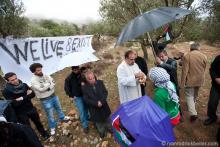
What one quickly learns when visiting Bethlehem is that the political climate today is quite similar to the one that was prevailing during the time of Jesus. One exception is that the Palestinian inhabitants of Bethlehem today are being occupied by those who consider themselves the offspring or cultural descendants of Jews who were under the yoke of Roman occupation in the first century. Other reminders of the political similarities are the weekly demonstrations on the outskirts of Bethlehem by Palestinians, Israelis, and internationals to nonviolently protest the confiscation of Palestinian land to build new Jewish settlements. Unarmed and nonviolent demonstrators face heavily equipped Israeli troops who protect those who steal Palestinian lands in the West Bank and construct segregated settlements on them. This reminds us of the brutality of the Roman occupation forces against Jewish freedom fighters.
But Bethlehem today is not all consumed with politics. Many of the folks in Bethlehem could not care less about politics. Repeated disappointments with the host of so-called peace brokers and failed peace plans have caused many Bethlehemites to abandon politics. They just want a decent standard of living to carry on with life in security with their children and grandchildren. These are the people who in spite of the same closures and repression by the forces of occupation, choose to be peaceful. They hope that freedom will come but they don't know when or how it will come. Like the folks who lived when Jesus was born, they continue to wait quietly for political liberation.
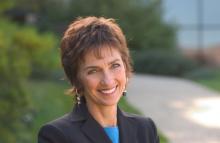
Increasingly, in meetings focused on a wide variety of human tragedies, I hear these words: "What are you doing here? I didn't think evangelicals cared about these things."
I understand those comments. I grew up in a form of Christianity in which "saving souls" was pretty much all that mattered. The God I discovered in that church was a harsh, demanding tyrant; I knew that if I wanted to earn God's love I would have to be very good, follow all the rules, and work very hard. As a devout adolescent I did that. As a young pastor's wife I did that.
Unfortunately, I worked a little too hard and eventually became utterly exhausted, seriously depressed, and physically sick. That plunged me into a total life crisis in which I felt compelled to give up the God of my childhood.
Fortunately, a wise friend said to me, "For a while, forget everything you've ever thought about Christianity; forget the Old Testament; forget Paul and the epistles-and just read Jesus."
So for months -- for years actually -- I just read Jesus. And slowly but surely, Jesus reshaped my understanding of what it meant to be a Christian.
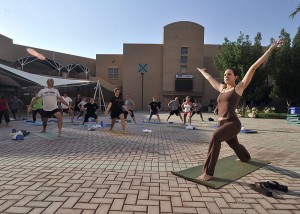 Just a few days after I returned from my respite in the mountains, Israeli forces killed eight Turkish nationals and one American on a Gaza-bound aid flotilla. Protests erupted all over Israel and Palestine.
Just a few days after I returned from my respite in the mountains, Israeli forces killed eight Turkish nationals and one American on a Gaza-bound aid flotilla. Protests erupted all over Israel and Palestine.
In the midst of this tragic chaos I found myself visiting my yoga center more often than usual, hoping to find another glimpse of the peace I had tasted so vividly just a few days before. Perhaps these wise, centered people could offer a perspective that would look forward to a vision of understanding, or reconciliation -- a vision too often missed by politicians, military officials, media, and even activists.
American Christian Zionism is pushing the U.S. government to support Israeli policies that our international friends find immoral and illegal.
We have come to believe that Christian Zionism underwrites theft of Palestinian land and oppresses Palestinian people, helps create the conditions for an explosion of violence, and pushes US policy in a destructive direction that violates our nation's commitment to universal human rights.
We write as evangelical Christians committed to Israel's security. We worry about your support for policies that violate biblical warnings about injustice and may lead to the destruction of Israel.
Once again last week the pages of the New York Times was graced with an ad published by David Horowitz's Freedom Center, one of those websites you visit and immediately begin to rethink the sanity of published discourse on the Web.
